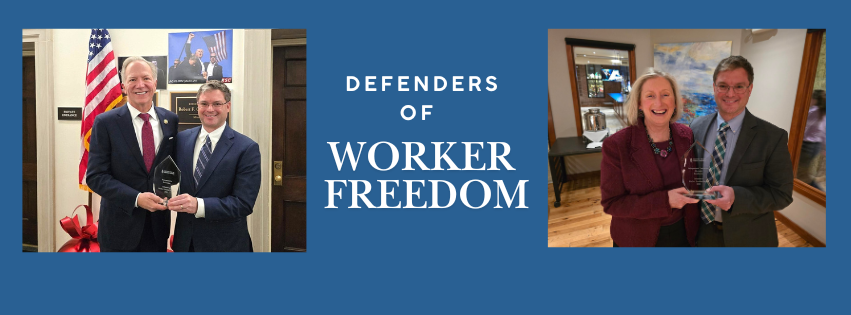Posts tagged Congress

I4AW Presents 2025 Defender of Worker Freedom Awards to Rep. Onder and Kim Kavin
December 15, 2025 // “Both Rep. Onder and Kim Kavin have used their unique positions to stand up for the American worker,” said I4AW President F. Vincent Vernuccio. “Rep. Onder has been a leader in Congress, keeping workers at the center of developing labor legislation. Kim Kavin continues to publicize the struggles independent workers face against government overreach and bring real life context to how specific regulations would hinder their ability to prosper.”
New Jersey’s GOP congressmen make rare break with Trump on collective bargaining
December 15, 2025 // New Jersey is one of the nation’s most heavily unionized states, and the state’s powerful unions frequently support politicians of both parties. Smith and Van Drew have received backing from the New Jersey AFL-CIO in recent re-election campaigns; during Kean’s 2024 campaign, meanwhile, the AFL-CIO chose to stay out of the race, which was seen as a victory for the congressman in a district that Democrats hoped to flip. Notably, though, none of New Jersey’s Republicans were part of the original effort to bring today’s collective bargaining bill to the floor in the first place. A discharge petition to force a vote on the bill got signatures from every House Democrat and five Republicans, but Kean, Van Drew, and Smith did not sign on.

Union bosses sue to defend system that helped turn federal prison into ‘rape club’
December 15, 2025 // Government union bosses wielding monopoly-bargaining privileges have on multiple occasions “frustrated and undermined accountability” in the oversight of federal prisoners, as even David Fathi of the generally pro-Big Labor American Civil Liberties Union has acknowledged. That’s why President Trump’s executive order from March is so important — it freed large swaths of the federal workforce from union bosses’ obstructionist power.

House strips its own provision protecting Defense civilians’ union rights from NDAA
December 11, 2025 // A source familiar with congressional negotiations said that the bipartisan language effectively nullifying President Trump’s anti-union executive orders as they pertain to the Pentagon was dropped due to lack of support in the Senate.
Opinion: The Senate can stop the NLRB’s threats to American freedom
December 8, 2025 // Trump’s nominees will restore the balance and discipline needed to repair the NLRB’s legitimacy and credibility with American workers. They understand that the NLRB’s role is not to pick winners and losers, but to protect workers’ rights and uphold secret ballots, as well as ensure union accountability and that information is not hidden from workers. Confirming them would restore the constitutional guardrails that keep government honest and workplaces free.
Editorial Board: America’s veterans deserve better care than government unions provide
December 8, 2025 // The smarter approach would be for Congress to affirm Trump’s decision to strip collective bargaining rights while dispensing with his flimsy national security justification. Consider the legacy of pro-union President Franklin D. Roosevelt, who opposed collective bargaining and strikes for federal employees. As Roosevelt and other pro-union leaders understood in the 1930s, collective bargaining is carried out against an employer. The government’s employer is the public. Allowing unelected labor union bosses to negotiate against the public’s elected representatives to determine how the government gets run is undemocratic.

Congress Can Empower Workers Through Choice—Not Coercion
November 24, 2025 // A case in point is the legislative package that Sen. Bill Cassidy (R-La.) introduced on Nov. 10, joined by others including Sens. Tommy Tuberville (R-Ala.) and Tim Scott (R-S.C). They’d protect workers’ paychecks by requiring unions to get approval before spending dues money on politics. They’d also protect workers’ privacy by letting them choose what contact information unions get during the organizing process. And they’d protect workplace democracy by requiring that at least two-thirds of workers participate in union elections — preventing a minority of people from determining the fate of every employee. Another praiseworthy reform is the Employee Rights Act, which Scott introduced in the shutdown’s early days after Rep. Rick Allen (R-Ga.) previously introduced it in the House. Among its many good ideas, the Employee Rights Act guarantees the secret ballot and protects workers from intimidation and harassment. It also gives unionized workers in the 26 right-to-work states the freedom to negotiate their own contract with their employer, so they can better address their individual needs. And the Employee Rights Act guarantees that self-employed workers have maximum flexibility to design their jobs to fit their lives.
Federal probe demands Chicago Teachers Union explain missing financial audits since 2020
November 24, 2025 // The Chicago Teachers Union (CTU) is under investigation by the House Education and Workforce Committee for allegedly failing to show how it has spent union members’ money over the past five years, according to a letter obtained by Fox News Digital. The committee sent a letter to CTU President Stacy Davis Gates stating that evidence suggests the union failed to provide members with complete financial audits since 2020. "When unions flout these obligations, they betray the trust of the very people they are meant to serve … Every dollar paid by workers should serve their interests, not those of a select few operating in the shadows," the letter said.

Institute for the American Worker (I4AW) Releases “How To Empower Workers” Report
November 19, 2025 // “Workers who are equipped with an updated labor policy framework won’t need to rely on the decisions of Washington politicians or union leaders. Instead, workers will be empowered to associate with the businesses and institutions that help them lead productive and fulfilling lives in the modern economy. Through giving Americans and their families choice and flexibility, we will create the best outcomes so that everyone can chase the American Dream—without needing anyone’s permission but their own.”
House majority forces vote on bill to restore collective bargaining for most federal employees
November 18, 2025 // Meanwhile, another bipartisan group of lawmakers is also leading a bill that would restore collective bargaining rights for VA employees. Sens. Richard Blumenthal (D-Conn.), Lisa Murkowski (R-Alaska), Chuck Schumer (D-N.Y.), and Rep. Delia Ramirez (D-Ill.) are leading that bill. The National Treasury Employees Union, as well as the National Weather Service Employees Organization and the Patent Office Professional Association, are also suing the Trump administration over its collective bargaining rollback. Federal courts in D.C. will hold proceedings in both cases next month.
